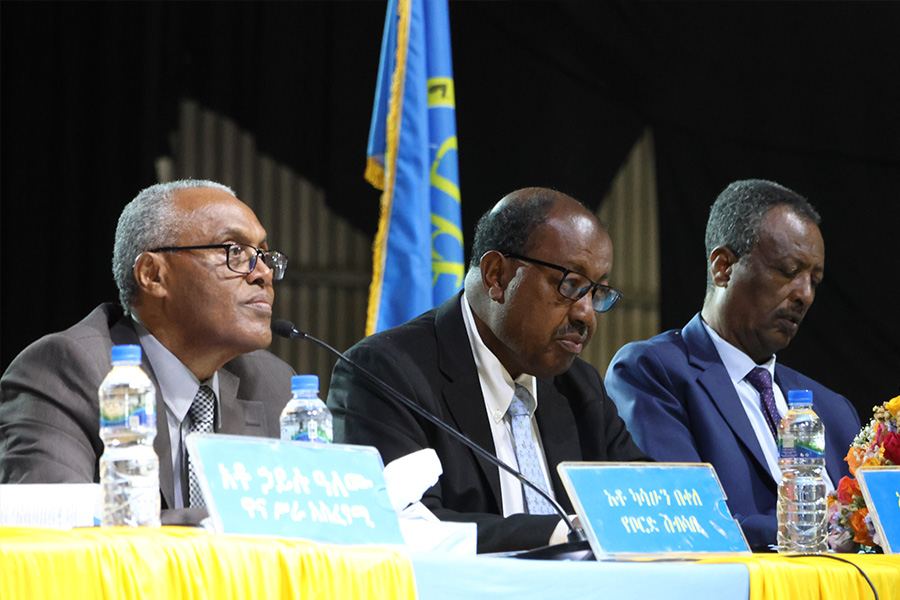
Radar | Dec 15,2024
Fortune: How has the labour movement evolved through its tumultuous half-a-century history?
Kassahun Follo: The beginning of the worker’s union was completely different from its current state. During the formative stages of the movement almost sixty years ago, there was no right to organize, bargain or a cap on working hours. There was no law bearing to employee rights and workers had to fight for the right to even sit at the negotiation table.
After the industrial revolution, workers had been fighting for their rights in several parts of the world reaching an understanding by members of the League of Nations that if worker rights are not respected there will not be lasting peace.
Despite the establishment of tripartite agreements in most countries between workers, government and employers, Ethiopia came into the industrial fold a little late leading to delayed legal frameworks for worker rights.
Early founders like Abraham Gemu created worker cooperative associations during the reign of Emperor Hailesellasie I and expanded these associations across the country. But even these initial stages were marked by serious grievances on working conditions.
We have to acknowledge the role the late Mesfin WeldeMariam (Prof) played in continuously supporting these early gatherings, even though they were mostly occurring under the shade of a tree or inside temples. CETU's current makeup was built on the back of these previous champions who challenged an order without even an existing law to appeal towards.
Fortune: Have the goals and strategies of CETU changed through the years?
CETU has always gone to negotiation first followed by appeals to our member federations who have their own lawyers who then take the issue to court on behalf of the workers free of charge.
We are definitely more organized and strategic with our approach. There is a mobile platform under development that will allow the complaints of workers to be processed digitally. It is the first of its kind in the continent allowing a two-week response period by the Union. CETU is working to make the voice of the workers heard with little inconvenience to their daily lives such as asking employers for leaves.
Fortune: How would you describe the Union’s success in comparison to its past?
We did not have worker unions in many institutions early on. Now we have formed unions and negotiating boards in some places. We currently benefit at the very least from a member voice when new laws and directives are created by the government that have an impact on worker rights. But it took a while to create a tripartite board consisting of five members from government, employers and workers. We currently work to increase the right to form associations within every industry.
Retirement packages were non-existent for people employed within private companies even in my lifetime. CETU managed to push this through a mere 11 years ago. I was part of the team lobbying to make this a reality. Until then, most employees were left destitute post-retirement.
Over the last decade, a consistent struggle to decrease the income tax of workers has been one of our main goals aside from pushing the minimum wage law.
Fortune: How do you consider the current state of worker rights globally and locally keeping in mind the global economy?
Indeed, worker rights are not just the concern of a poor country but all nations of differing Economic makeup. It is a global issue. The growth of a country typically leads to a concurrent rise in living conditions which become inaccessible without a parallel increase in wages. A global shock like Covid -19 led to the laying off of several workers globally. Ethiopia actually managed that very well by prohibiting the firing of workers through an emergency regulation. The tripartite board helped in that period.
The 2008 global recession is another instance in which workers were greatly impacted. The current Russo-Ukraine war is an unprecedented hurdle to the global economy which stops the gear on several key social factors as well as creates a surge in price levels for everyone concerned.
On both a global and local scale the living condition of workers has become sensitive to shifts in the economy. Conflict, drought and inflation compound to make the independent person rely on others. We are constantly working to approach all concerned bodies especially the government with the identification of the problem and solution.
Fortune: What would you like to have achieved before foregoing your responsibilities?
Everything in CETU is done through a committee so no individual holds too much sway on the course of events, solely relying on our five-year strategic plan. But the realization of minimum wage laws in Ethiopia would be a significant milestone I would like to reach.
A minimum wage law warrants some sense of dignity at the very least. Once we manage to incorporate this into the body of laws governing the country, I believe successive generations will benefit from improved living conditions.
We have to at least be at par with our close neighbours. Kenya for instance has a minimum wage of 125 dollars, which the president even suggested would be raised by six percent at last year's May Day celebration.
Fortune: Why do you think reports of worker rights violations or even despondence to the creation of worker unions for manufacturers within the country's industrial parks have become frequent?
Two reasons stick out to me although it might arise from a combination of reasons. One such pivotal cause is that these companies come into the country allured by the promise of very cheap labour. It seems that they mix up 'cheap' labour with insensitivity to working conditions and basic labour rights. I have experienced instances in which the companies were surprised that there was someone around asking questions about labour rights “like other countries”.
Some of these investors actually hail from countries with better labour rights than Ethiopia but they somehow do not expect anyone to enquire about it here. So they become very averse as they think it will lead to insistence on professional safety requirements. But the right to safety gear was already ingrained by the labour law, which means adherence to safety protocols should not be contingent on whether the workers ask or not. It is not as if the workers are asking for some sort of luxury, it is a necessity.
The other one is a fear that somehow costs will rise if wages increase despite increased productivity. It is disputable to expect someone to live off with less than a 1000 Br salary for instance, if the employee eats even once a day with 50 Br will not make it past half the month.
Sometimes I hear the so-called economists warn of distortion to the market if minimum wages are in place. But we have at least managed to convince most of the employers in industrial parks over the past year. It is very immature to assume that companies that have crossed oceans to establish businesses in Ethiopia will hire anyone for charity. They do it because it is profitable and hence they should pay in proportion to their earnings after a certain threshold.
These companies are mobile. Most take their earnings out of the country instead of reinvestment in large-scale projects. They take a chunk of the change and leave with almost no skin in the game with regard to the workers or the economic destiny of the country.
Fortune: Economists project a large withdrawal from the labour force in the coming decades with the rise of automated systems and artificial intelligence. How do you look at the payment of a universal basic payment regardless of work?
Well, it requires a careful calibration between the substitution of labour with more advanced technology and the cost to the labour force left up in the air. The global North for instance does not merely fire its employees and bring in some technology to do the work. They have generous severance packages to accommodate several of the basic needs.
A job for someone on this side of the world could literally be a matter of life and death. Getting employment in the first place is quite a challenge. Immediate cessation of a livelihood would lead to serious instability. A serious instability in the social order will threaten the very existence of these new technologies that are somehow meant to replace the labour force. Suggesting basic income or another alternative would yield a solution to the issue although it needs rigorous scientific study.
PUBLISHED ON
Apr 29,2023 [ VOL
24 , NO
1200]

Radar | Dec 15,2024

Verbatim | Mar 16,2019

Life Matters | Jul 30,2022

Radar | Jul 06,2019

My Opinion | May 03,2025

Letter To Editor | Mar 02,2019

Editorial | Nov 16,2019

Radar | Feb 15,2020

Fortune News | Dec 19,2018

Radar | Aug 22,2020

Dec 22 , 2024 . By TIZITA SHEWAFERAW
Charged with transforming colossal state-owned enterprises into modern and competitiv...

Aug 18 , 2024 . By AKSAH ITALO
Although predictable Yonas Zerihun's job in the ride-hailing service is not immune to...

Jul 28 , 2024 . By TIZITA SHEWAFERAW
Unhabitual, perhaps too many, Samuel Gebreyohannes, 38, used to occasionally enjoy a couple of beers at breakfast. However, he recently swit...

Jul 13 , 2024 . By AKSAH ITALO
Investors who rely on tractors, trucks, and field vehicles for commuting, transporting commodities, and f...

Sep 13 , 2025
At its launch in Nairobi two years ago, the Africa Climate Summit was billed as the f...

Sep 6 , 2025
The dawn of a new year is more than a simple turning of the calendar. It is a moment...

Aug 30 , 2025
For Germans, Otto von Bismarck is first remembered as the architect of a unified nati...

Aug 23 , 2025
Banks have a new obsession. After decades chasing deposits and, more recently, digita...